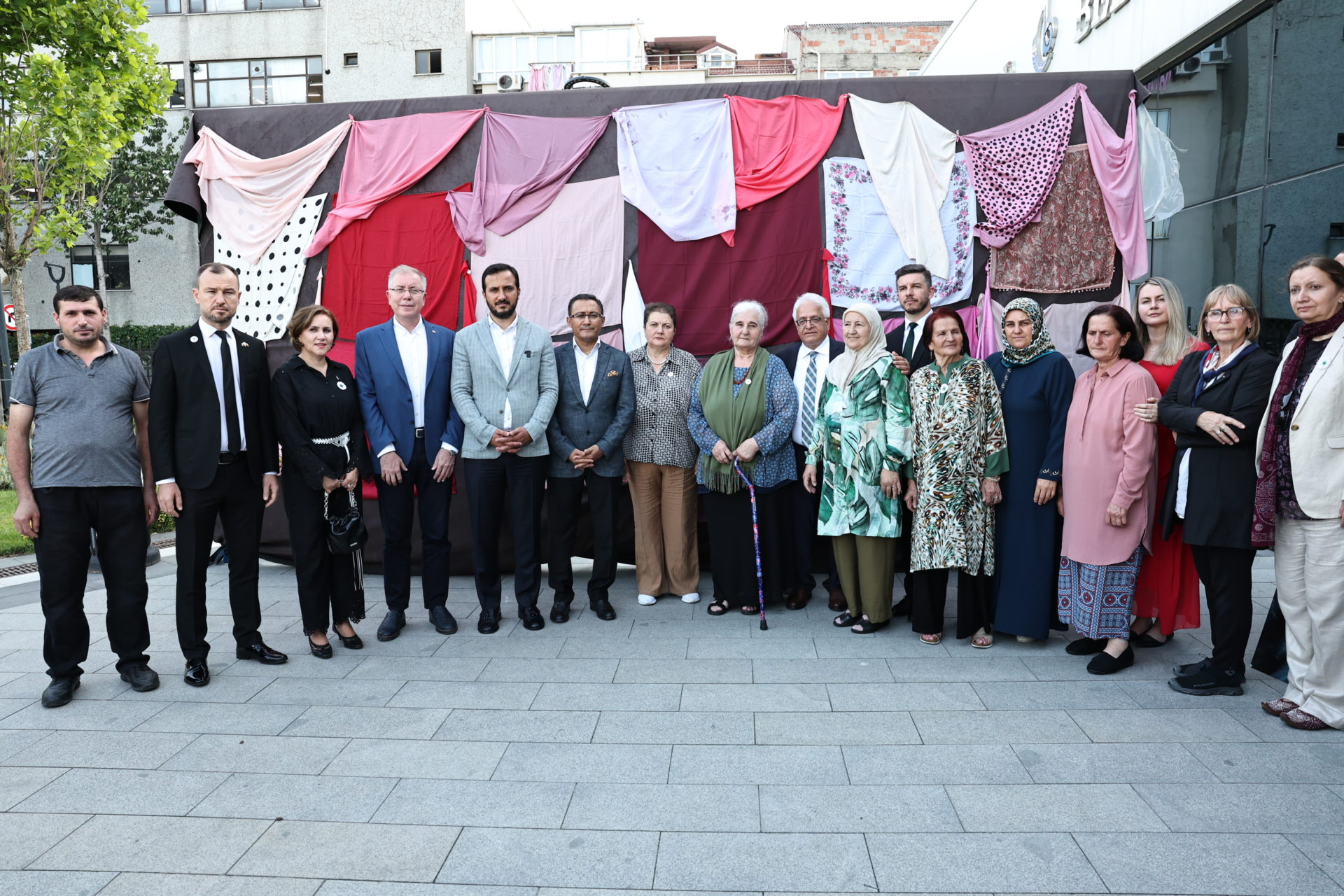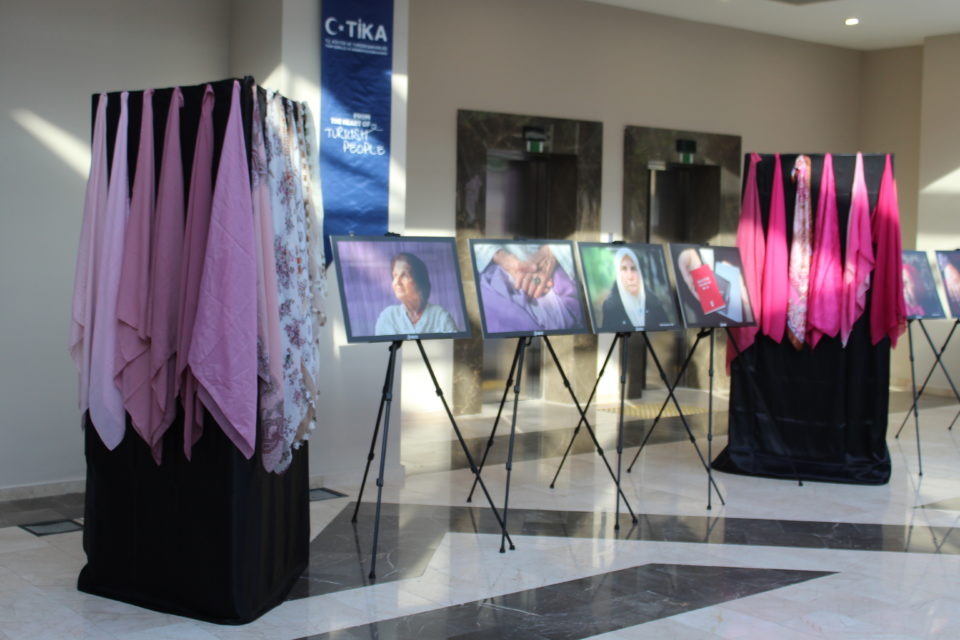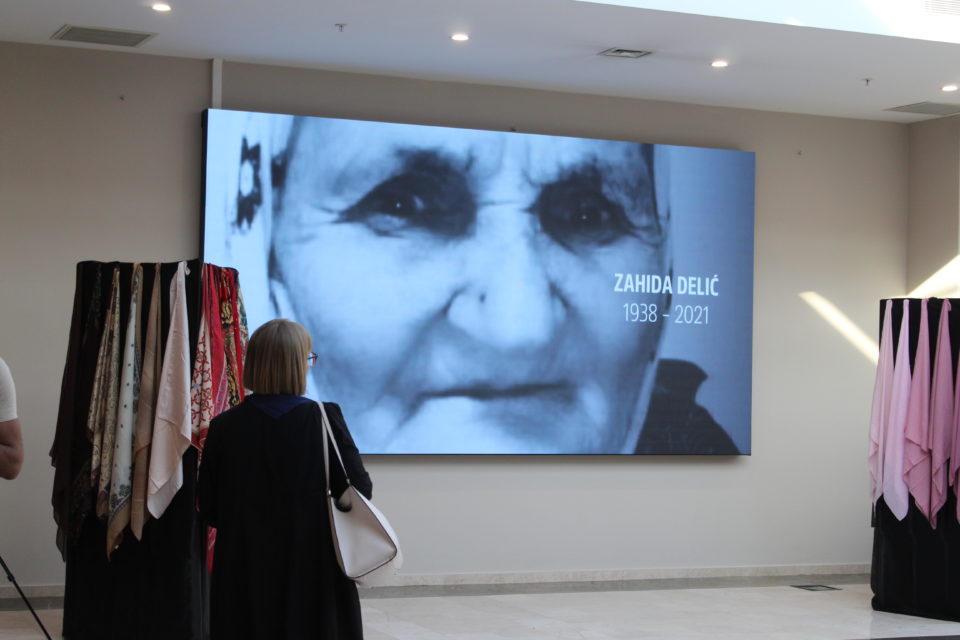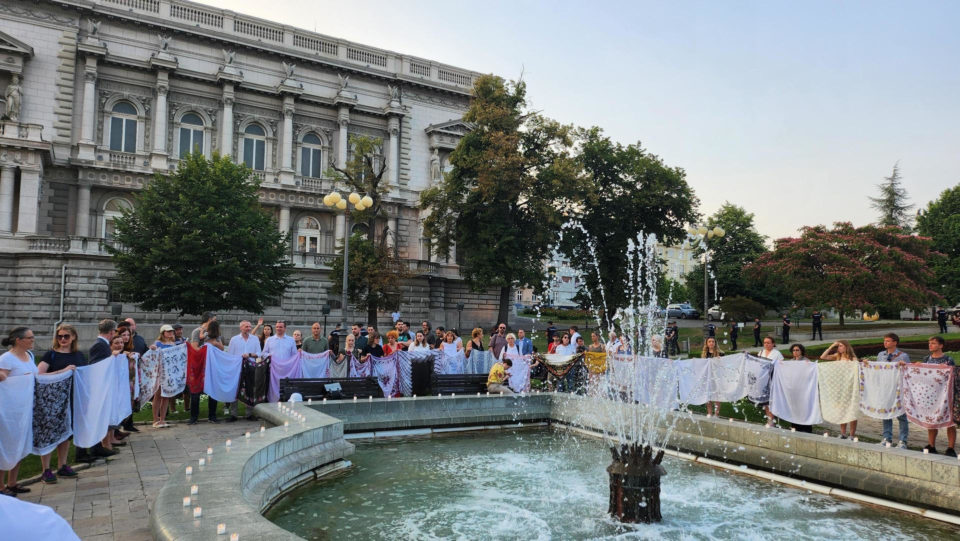
In commemoration of the 28th anniversary of the Srebrenica genocide, the exhibition “Mother’s Scarf” was displayed in Istanbul and Belgrade. The installation demonstrates the solidarity of women around the world with the mothers of Srebrenica, sending a message of unity in the fight for truth.
“Through this exhibition, we mothers want to tell the world that we are still here, that we are looking for the truth and waiting for justice,” said Munira Subašić, President of the Movement of Mothers of the Srebrenica and Žepa Enclaves. She describes the headscarf as a symbol of what she will never give up: justice for her loved ones.
Velma Šarić, President and Founder of the Post-Conflict Research Center (PCRC), explained that “Mother’s Scarf” aims to foster solidarity among women and mothers worldwide, strengthening the bond between the mothers of Srebrenica and all other women. She noted that over 3,000 scarves and shawls were collected from more than 20 countries and over 50 cities around the globe. Symbolically, as Šarić emphasized, the connection of the scarves represents unity with the mothers of Srebrenica, showing that they are not alone and that the whole world stands behind them.
“Mother’s Scarf” debuted last year in Potočari during the commemoration of the genocide’s anniversary, as part of the “Srebrenica Heroines” project created by the Post-Conflict Research Center, the Mothers of Srebrenica, and the Srebrenica Memorial Center. This year, the installation was presented on July 4th in Istanbul’s Bagcilar municipality, and on July 1th1 in Belgrade.

The installation in Bagcilar was organized by representatives of the municipality, with the support of the Turkish Agency for Cooperation and Coordination (TIKA). It was accompanied by two exhibitions, “Scarves of Remembrance” and “Memento,” with the purpose of preserving collective memory and paying tribute to the resilience and struggle of the mothers and women of Eastern Bosnia. Additionally, a corresponding program was held to honor the victims of Srebrenica.
“You must not forget the genocide that was committed, because a forgotten genocide is a repeated genocide. This is the principle we adhere to here,” said Abdullah Ozdemir, Mayor of Bagcilar municipality, emphasizing the noble struggle of the mothers of Srebrenica.
Mahmut Cevik, Vice President of TIKA, described his respect for the mothers as “living witnesses of the genocide in Srebrenica.”
“Centuries pass, a tragedy remains a tragedy. And a tragedy happened 28 years ago in Srebrenica. Sadness and pain will never disappear and what was done will not be erased from our memories. A country in the heart of Europe was attacked by aggressors,” Cevik stated.
Abdullah Ucgun, the District Governor of Bagcilar municipality, addressed the gathering of citizens of Istanbul and guests from Bosnia and Herzegovina, saying, “If we don’t want massacres and genocides to happen again, we must know the reason why they were committed. Therefore, I am telling all Bosnians, especially young people, not to forget their culture and traditions. If you separate yourself from your essence, you will forget why you exist. Don’t be fooled by what seems attractive and beautiful because it can separate you from your reality.”
Adis Alagić, the ambassador of Bosnia and Herzegovina in Turkey, paid tribute to all the genocide victims and emphasized the need to support the returnees in Srebrenica, who made the courageous decision to return to their hearths despite all of the hardship this entails.
The program included a screening of the film “Cases of Evil: Vlasenica,” produced by PCRC. The aim of the film is to preserve the memory of victims, including survivors of sexual violence, through their stories, and to highlight the resilience of survivors and the experiences of those who returned to Vlasenica after the war.

“It was very important to me that we watch this film here today because this film is our reality. Our fight has not ended because genocide and crimes are still denied in our country. And this is why we must constantly remember what was done,” said Šarić.
Kada Hotić, the Vice-President of the Mothers of the Srebrenica and Žepa Enclaves Association, also addressed those present.
“We didn’t even imagine that someone would attack us. But suddenly, they did attack us. Again, we thought that it would pass quickly, unaware of the danger of what was about to happen,” said Hotić, who lost 56 members during the genocide in just two days.
Despite everything they endured, Hotić emphasizes that the mothers of Srebrenica did not teach their children hatred. “We are most proud of that. That we managed to raise and educate our children, who today do not harbor hatred,” said Hotić.
Emir Suljagić, the Director of the Srebrenica Memorial Center, emphasized his gratitude to Turkey on behalf of both Srebrenica and the Memorial Center.
“Once we bring this project to an end, we will be able to say that the Turkish people through TIKA, were a true friend of Srebrenica,” remaked Suljagić.
From Istanbul, the “Mother’s Scarf” exhibition made its way to Belgrade, in front of the Serbain presidency at Andrićev Venac, where on July 11th, a commemoration was held to honor Srebrenica’s victims. During the event, which was organized by the Youth Initiative for Human Rights of Serbia, the citizens of Belgrade, particularly the youth, paid their respects to the victims by connecting scarves together and lighting candles.

Sofija Todorović, the Program Director of the Youth Initiative for Human Rights Serbia, said that this served as “a reminder of everything connected to the genocide in Srebrenica, which is also connected to us, and which we must not forget. That is our responsibility.”
The “Mother’s Scarf” exhibition will continue its journey to other countries, serving as a reminder of the collective strength of women and mothers in the fight for justice and human rights.





